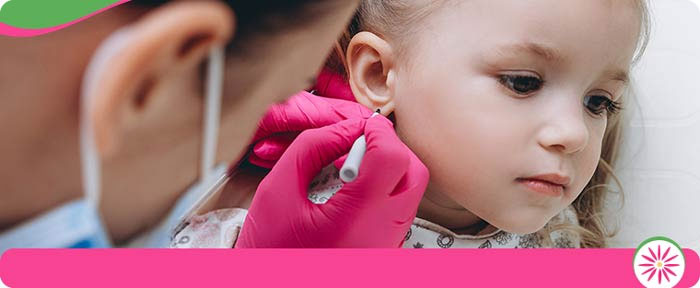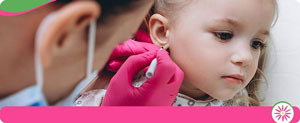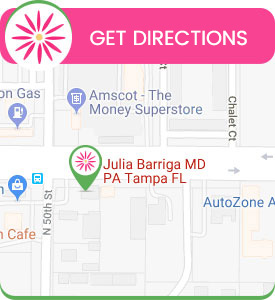What You Should Know Before Getting Your Baby’s Ears Pierced?
The safest place to have your child’s ears pierced is a medical facility. Pediatricians use the proper materials for children’s earrings to lower the possibility of any allergic reaction. Dr. Julia B. Barriga, M.D., and her team offer safe and comfortable ear piercing at Julia Barriga M.D. P.A. For more information, contact us or schedule an appointment online. We are located at 5001 East Busch Blvd Tampa, FL 33617.


Ear Piercing for Newborns, for Established Patients Only!
Table of Contents:
How old should your baby be to get their ears pierced?
What risks come with having your baby’s ears pierced?
Where should you get your baby’s ears pierced?
What should you do if you see signs of infection?
Having your child’s ears pierced while they are still a baby is a very common thing to do, both culturally, and in order to avoid them remembering the pain associated with the experience. However, it is important that you are educated about the risks and that you speak with your pediatrician beforehand to ensure that the process will be as safe as possible for your baby.
Many pediatricians will recommend waiting until your baby is at least 3 months old, as that is when they are no longer considered a newborn, so if they did happen to develop an infection with a fever, it is less likely that you would need to take them to a hospital. As well, it is recommended that you wait until the baby has received a tetanus shot, even though the risk is small, just to be safe; they typically receive the first dose when they are 2 months old. Speak to your pediatrician to ensure that your baby has had any necessary vaccinations and is old enough before having their ears pierced, just to be safe.
The risks associated with having your baby’s ears pierced are no different from those associated with someone of any other age having their ears pierced. However, if they are under three months old and develop an infection, they may experience more long-term effects. Other risks associated with getting pierced include the realization of an allergy to a metal, so it is important to make sure that the jewelry used is hypoallergenic and of good quality. It is super important that you do research on where to get the piercings done to avoid other complications such as infections, the formation of keloids, ear tearing, embedded backings, and deformation of the ear.
To minimize the risk of infection as much as possible, many people will opt to have their baby’s ears pierced at a healthcare office to ensure that all of the tools required are properly sterilized. You should not have your baby’s ears pierced at a jewelry store or a kiosk in a mall, as the people who are providing the piercing are likely to be more inexperienced, and many of those places use piercing guns instead of needles, which are not properly sterilized. Many pediatricians will be able to pierce your baby’s ears for you to ensure that they are done properly, but if they do not offer that, they will be able to recommend somewhere reputable for you to go to ensure your baby’s safety. As well, healthcare professionals that offer piercing services will only use metals that are of high quality and will make sure that you are fully aware of all of the after-care instructions. Doctors may also offer to apply a little bit of topical anesthesia to minimize the pain that your baby experiences.
To treat an infection, you must first know what symptoms to look out for to identify if a piercing is becoming infected. Redness and swelling both on the ears and potentially spreading to other parts of the ears and face, persistent itching of the area, puss or discharge being eliminated from the piercing, general discomfort indicated by your child’s body language, and a fever of more than 100 degrees Centigrade are some of the symptoms that a baby will develop if they have infected ear piercings. If your baby is displaying any of these symptoms, some tips to help treat the infection include:
• Leave the earring in, unless it is clearly an allergy to the metal, it is better to leave the earring in until the piercing has completely healed.
• Apply a warm compress to the piercing to help reduce any swelling or puss.
• Only use a sterile saline solution to clean the area twice a day, harsh chemicals or rubbing alcohol will further irritate your baby’s skin.
• Ensure that the piercing is kept clean and that your baby does not touch their ear.
• Always ask for your pediatrician’s advice before starting any medications like antibiotics.
• If the infection persists for 2 or more days, seek medical attention.
Get safe and secure ear piercings for your child at Julia Barriga, M.D. P.A. Our board-certified pediatrician, Dr. Julia B. Barriga, M.D.and her team take special care and take all required safety measures to avoid any infection. For more information, contact us or schedule an appointment online. We are located at 5001 East Busch Blvd Tampa, FL 33617. We serve patients from Tampa FL, Terrace FL, Thonotosassa FL, Lutz FL, Greater Carrollwood FL, Lake Magdalene FL, Westchase FL, and Town ‘N’ Country FL.
Check Out Our 5 Star Reviews


Additional Services We Offer
- Dental Fluoride Varnish
- Newborn Care
- Vaccines/Immunizations
- Health Education & Counseling
- Physical Examinations
- Hearing & Vision Screening
- Management of Chronic Conditions
- Comprehensive Well Visits
- Asthma Management
- Diabetes Management
- ADD/ADHD Management
- Diagnostic Services
- Ear Piercing
- Prenatal Consults
- In House Lab Testing
- Get Acquainted Consults
- Covid Testing
- Flu Testing
- RSV Testing








